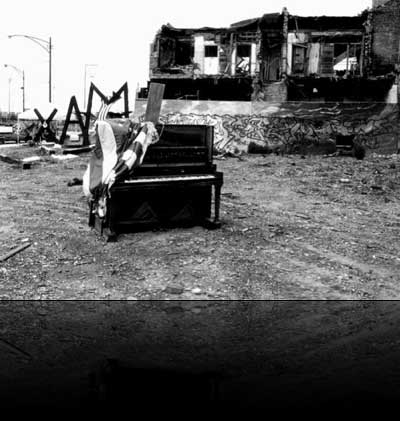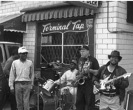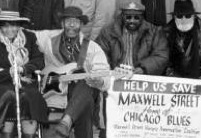
Maxwell St. Market, Chicago
“First we’re gonna kill it, then we’ll take it apart, then we’ll kill it again”. It’s not like Chicago was exactly overflowing with cultural gathering places. In fact it’s a very segregated city. Yet for more than a hundred years Maxwell St. market or Jew Town, has been a place for the mixing of the colors and the social strata. I think that’s really the reason that they want it so badly destroyed and dismembered. To keep the people separated and confused.
In case you don’t know it, Maxwell St. is the market that you might recall was in the Blues Brothers movie where John Lee Hooker  is playing on the street in front of the Polish sausage stands. I used to see some of the most amazing blues musicians there. There were always electrified groups cranking out screamin’ blues from ungodly early until late afternoon every Sunday in summer’s heat or winter’s cold (and it gets f!@#$%^ng cold in Chicago!)
is playing on the street in front of the Polish sausage stands. I used to see some of the most amazing blues musicians there. There were always electrified groups cranking out screamin’ blues from ungodly early until late afternoon every Sunday in summer’s heat or winter’s cold (and it gets f!@#$%^ng cold in Chicago!)
 is playing on the street in front of the Polish sausage stands. I used to see some of the most amazing blues musicians there. There were always electrified groups cranking out screamin’ blues from ungodly early until late afternoon every Sunday in summer’s heat or winter’s cold (and it gets f!@#$%^ng cold in Chicago!)
is playing on the street in front of the Polish sausage stands. I used to see some of the most amazing blues musicians there. There were always electrified groups cranking out screamin’ blues from ungodly early until late afternoon every Sunday in summer’s heat or winter’s cold (and it gets f!@#$%^ng cold in Chicago!)
I remember one old blind black lady that would really blow me away. She wore old clothes and a bonnet that looked like they were from a hundred years before, (they probably were). Her eyes were all white and had a kind of Popeye-ish shape to her face. While playing the acoustic guitar with a real bottle neck cut off of a bottle she would sing in a style that I’ve never heard anywhere else. I can only describe it as if a large whippoorwill had suffered it’s whole life and learned to sing the blues. If anybody reading this knows anything at all about this woman, I’d really like to hear it!
The market, affectionally called “Max” by her friends,  was started by Jews freshly immigrated from Europe before 1900. During the great depression it was the only place that many people could afford to shop or make a buck. I know a lot of people who’s families had started their American dreams right there fresh off the boats.
was started by Jews freshly immigrated from Europe before 1900. During the great depression it was the only place that many people could afford to shop or make a buck. I know a lot of people who’s families had started their American dreams right there fresh off the boats.
 was started by Jews freshly immigrated from Europe before 1900. During the great depression it was the only place that many people could afford to shop or make a buck. I know a lot of people who’s families had started their American dreams right there fresh off the boats.
was started by Jews freshly immigrated from Europe before 1900. During the great depression it was the only place that many people could afford to shop or make a buck. I know a lot of people who’s families had started their American dreams right there fresh off the boats. The things you would find for sale when I was younger at the market were unbelievable at any price, but usually the price was incredibly cheap. I used to buy every instrument ever made by man there: trumpets, tubas, trombones, clarinets, guitars, ukuleles, banjos, accordions, organs, pianos and things that defy description and almost never pay more than $10 for anything! I remember one time I saw this huge iron contraption as big as a small refrigerator that caught my eye across a space full of old rusty metal. When I got closer to it, I was at once amazed by the old style craftsmanship and that it looked absolutely new.  Not a scratch on it. At first, I thought it must’ve been a very large sewing machine. I even noticed that it had a box of needles in an open drawer. Then I noticed the manufacturer’s plaque which said that it was built in the factory of a certain Thomas Edison. I realized that it was an old cylindrical record player and recorder! I asked the guy how much he wanted for it just as I always do, just for curiosity. He said, “Would’ya gimme ten bucks for it?”. I couldn’t believe it. The thing was huge and heavy though. There was no way I could move it. I looked at the guy who looked like most of the other sellers at Maxwell St. in those days, somebody who would drive all over the city all week collecting trash to bring and sell at the market on Sunday. I said to him that he must be crazy. I told him that I didn’t know how much the thing was worth, but surely a lot more than $10. That’s when he asked what the heck it was! When I told him, he said, “No?”. I said, “Yup!”. Then he pulled a huge crate out of his truck and said to me, “So that’s what all dees tubes is fo’!”. Maxwell St. used to be loaded with stuff like that. The motto of Maxwell St. has always been, “Cheat you fair”.
Not a scratch on it. At first, I thought it must’ve been a very large sewing machine. I even noticed that it had a box of needles in an open drawer. Then I noticed the manufacturer’s plaque which said that it was built in the factory of a certain Thomas Edison. I realized that it was an old cylindrical record player and recorder! I asked the guy how much he wanted for it just as I always do, just for curiosity. He said, “Would’ya gimme ten bucks for it?”. I couldn’t believe it. The thing was huge and heavy though. There was no way I could move it. I looked at the guy who looked like most of the other sellers at Maxwell St. in those days, somebody who would drive all over the city all week collecting trash to bring and sell at the market on Sunday. I said to him that he must be crazy. I told him that I didn’t know how much the thing was worth, but surely a lot more than $10. That’s when he asked what the heck it was! When I told him, he said, “No?”. I said, “Yup!”. Then he pulled a huge crate out of his truck and said to me, “So that’s what all dees tubes is fo’!”. Maxwell St. used to be loaded with stuff like that. The motto of Maxwell St. has always been, “Cheat you fair”.
 Not a scratch on it. At first, I thought it must’ve been a very large sewing machine. I even noticed that it had a box of needles in an open drawer. Then I noticed the manufacturer’s plaque which said that it was built in the factory of a certain Thomas Edison. I realized that it was an old cylindrical record player and recorder! I asked the guy how much he wanted for it just as I always do, just for curiosity. He said, “Would’ya gimme ten bucks for it?”. I couldn’t believe it. The thing was huge and heavy though. There was no way I could move it. I looked at the guy who looked like most of the other sellers at Maxwell St. in those days, somebody who would drive all over the city all week collecting trash to bring and sell at the market on Sunday. I said to him that he must be crazy. I told him that I didn’t know how much the thing was worth, but surely a lot more than $10. That’s when he asked what the heck it was! When I told him, he said, “No?”. I said, “Yup!”. Then he pulled a huge crate out of his truck and said to me, “So that’s what all dees tubes is fo’!”. Maxwell St. used to be loaded with stuff like that. The motto of Maxwell St. has always been, “Cheat you fair”.
Not a scratch on it. At first, I thought it must’ve been a very large sewing machine. I even noticed that it had a box of needles in an open drawer. Then I noticed the manufacturer’s plaque which said that it was built in the factory of a certain Thomas Edison. I realized that it was an old cylindrical record player and recorder! I asked the guy how much he wanted for it just as I always do, just for curiosity. He said, “Would’ya gimme ten bucks for it?”. I couldn’t believe it. The thing was huge and heavy though. There was no way I could move it. I looked at the guy who looked like most of the other sellers at Maxwell St. in those days, somebody who would drive all over the city all week collecting trash to bring and sell at the market on Sunday. I said to him that he must be crazy. I told him that I didn’t know how much the thing was worth, but surely a lot more than $10. That’s when he asked what the heck it was! When I told him, he said, “No?”. I said, “Yup!”. Then he pulled a huge crate out of his truck and said to me, “So that’s what all dees tubes is fo’!”. Maxwell St. used to be loaded with stuff like that. The motto of Maxwell St. has always been, “Cheat you fair”. It’s changed a lot over the years. They’ve really tried to kill it in every way possible. Everything’s been regulated and controlled now. No more stolen merchandise, (well no so much anyway). Everybody’s got licenses and assigned spaces now. The University of Illinois which for a long time had bordered on the Market area began to covet the land and after a long and arduous battle, (it was a lost cause from the beginning!) , the market was moved across Halstead and made MUCH smaller.
It’s changed a lot over the years. They’ve really tried to kill it in every way possible. Everything’s been regulated and controlled now. No more stolen merchandise, (well no so much anyway). Everybody’s got licenses and assigned spaces now. The University of Illinois which for a long time had bordered on the Market area began to covet the land and after a long and arduous battle, (it was a lost cause from the beginning!) , the market was moved across Halstead and made MUCH smaller. You could still find a deal or two every few weeks, but nothing like before, but none the less people still got up early to hunt a bargain and be amongst the people from every neighborhood in Chicago. While back in the city for 2000 and 2001 I took to playing in the market almost every Sunday. I tried to play all over the city, but the only place where I ever made any money was there at Maxwell St. surrounded by the poorest people in the city. I struck up a friendship with Commissioner Caroline Schoenberger who was responsible for the market during this period. She would often tell me of how difficult it was to keep it going. I’ve heard that somebody high up in city politics wanted it wiped out completely. She never said who, but if you live in Chicago, it’s not hard to guess.
friendship with Commissioner Caroline Schoenberger who was responsible for the market during this period. She would often tell me of how difficult it was to keep it going. I’ve heard that somebody high up in city politics wanted it wiped out completely. She never said who, but if you live in Chicago, it’s not hard to guess.
 friendship with Commissioner Caroline Schoenberger who was responsible for the market during this period. She would often tell me of how difficult it was to keep it going. I’ve heard that somebody high up in city politics wanted it wiped out completely. She never said who, but if you live in Chicago, it’s not hard to guess.
friendship with Commissioner Caroline Schoenberger who was responsible for the market during this period. She would often tell me of how difficult it was to keep it going. I’ve heard that somebody high up in city politics wanted it wiped out completely. She never said who, but if you live in Chicago, it’s not hard to guess.Now, I hear that they’ve moved it again. The ONLY true and original culture that Chicago has ever had, and all that they can think of is to destroy it! I like to think that hidden in the heart of the Maxwell St. market there lies magic. And when that magic is finally gone... the empire will crumble!
Probably not. Maybe no one will even care,  but it would serve ‘em right! Every time I go back it makes me want to sing “Look What They Done to My Song, Ma...”.
but it would serve ‘em right! Every time I go back it makes me want to sing “Look What They Done to My Song, Ma...”.
 but it would serve ‘em right! Every time I go back it makes me want to sing “Look What They Done to My Song, Ma...”.
but it would serve ‘em right! Every time I go back it makes me want to sing “Look What They Done to My Song, Ma...”.
Flogging a Horse That Just Won’t Die
mercoledì 28 marzo 2001
Besides two by my wife, Emanuela Ambrosino, the photos on this page were all collected several years ago from other sites. I hope the photographers can forgive my borrowing them. I thank you on behalf of Max.
©2007 StranieroVision